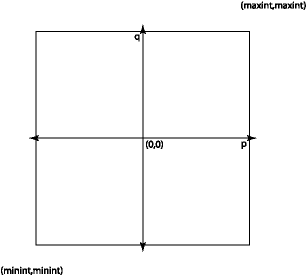Test Coverage
We would like to know that a program works on all possible inputs. The
problem with testing is that it is usually infeasible to try all the
possible inputs. For example, suppose that we are implementing a module
that provides an abstract data type for rational numbers. One of its
operations might be an addition function plus, e.g.:
(** AF: [(p,q)] represents the rational number p/q
RI: [q] is not 0 *)
type rational = int*int
(** [create p q] is the rational number p/q.
Raises: [Invalid_argument "0"] if [q] is 0 *)
val create : int -> int -> rational
(** [plus r1 r2] is r1 + r2 *)
val plus : rational -> rational -> rational
What would it take to exhaustively test just this one function? We'd
want to try all possible rationals as both the r1 and r2 arguments.
A rational is formed from two ints, and there are ints on a
modern OCaml implementation. Therefore there are approximately
possible inputs to the plus function. Even
if we test one addition every nanosecond, it will take about 10^59 years
to finish testing this one function.
Clearly we can't test software exhaustively. But that doesn't mean we should give up on testing. It just means that we need to think carefully about what our test cases should be so that they are as effective as possible at convincing us that the code works.
Consider our create function, above. It takes in two integers p and
q as arguments. How should we go about selecting a relatively small
number of test cases that will convince us that the function works
correctly on all possible inputs? We can visualize the space of all
possible inputs as a large square:

There are about points in this square, so we can't afford to test them all. And testing them all is going to mostly be a waste of time—most of the possible inputs provide nothing new. We need a way to find a set of points in this space to test that are interesting and will give a good sense of the behavior of the program across the whole space.
Input spaces generally comprise a number of subsets in which the behavior of the code is similar in some essential fashion across the entire subset. We don't get any additional information by testing more than one input from each such subset.
If we test all the interesting regions of the input space, we have achieved good coverage. We want tests that in some useful sense cover the space of possible program inputs.
Two good ways of achieving coverage are black-box testing and glass-box testing. We discuss those, next.